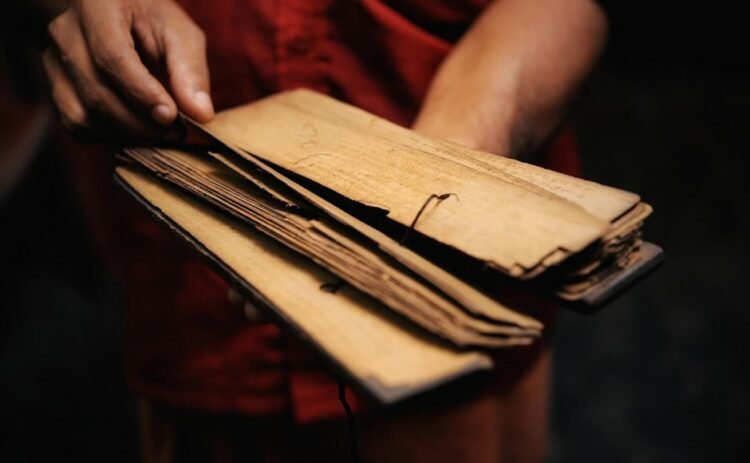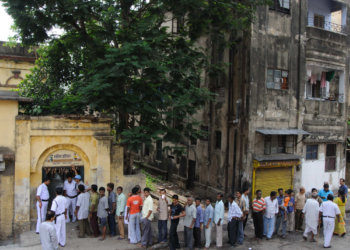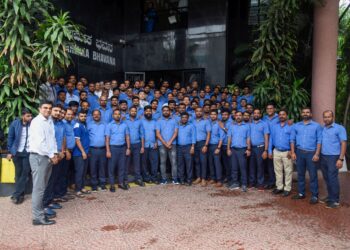NEW DELHI (India CSR): Dharmendra Pradhan, Union Minister of Education and Skill Development today launched a textbook on ‘Introduction to Indian Knowledge Systems: Concepts and Applications”. Subhas Sarkar, Minister of State for Education along with K Sanjay Murthy, Secretary Higher Education, A.D Sahasrabudhe, AICTE Chairman and representatives from AICTE, IKS Division and Ministry of Education attended the programme.
Dharmendra Pradhan expressed his happiness that the authors have given an academic framework to Indian Knowledge System in this book. Pradhan spoke about the global footprint of Indian knowledge, culture, philosophy and spirituality. He spoke about the ancient Indian civilisation and how it has positively impacted the world.
Speaking about Vedas, Upanishads and other Indian texts, he said that our ancient heritage is full of treasures which need to be preserved, documented and propagated. He also spoke about various examples of science-based practices and knowledge from ancient India which we can find relevant still in the modern world.
The Minister said that Indian education system is being decolonised under the leadership of Prime Minister Shri Narendra Modi. While we adopt the good things from our ancient past, we must also be mindful of the problems in our society and build a future which which creates synergy between knowledge from the past and contemporary issues . Solutions to many of world’s problems lie in Indian Knowledge System, he added.
This book seeks to fill in the gap for offering a required course on IKS, recently mandated by AICTE. Moreover, the New Education Policy (NEP) has also provided a clear trajectory for imparting IKS in the higher education curriculum, necessitating a book of this kind in several higher education institutions in the country in the days to come.
Although the book has been primarily developed for use by the Engineering institutions, the structure and the contents lend itself easily to address the requirement in other University systems (Liberal Arts, Medicine, Science and Management) for such a book. The newly released IKS textbook will enable the students to bridge the divide between traditional and modern education system by providing students with an opportunity to reconnect with the past, build holistic scientific temper and utilize it for carrying multidisciplinary research and innovation.
The textbook curriculum is developed by Indian Institute of Management, Bangalore in association with VYASA Yoga Institute, Bengaluru, and Chinmaya Vishwa Vidyapeeth, Ernakulam. It is written by Prof. B Mahadevan, IIM Bangalore and co-authored by Assoc Prof. Vinayak Rajat Bhat, Chanakya University, Bengaluru, and Nagendra Pavana R N, with the school of Vedic Knowledge Systems at Chinmaya Vishwa Vidyapeeth, Ernakulam.
Dr Subhas Sarkar mentioned the need of learning about the traditional Indian Knowledge Systems. He cited examples from Ayurveda, construction of ships in ancient times, aircraft knowledge, architect of Indus Valley Cities, and political science which existed in ancient India.
He appreciated the book on Introduction to Indian Knowledge System which seeks to introduce the epistemology and ontology of the Indian Knowledge Systems in all domains of life, to the Engineering and Science students in a way they can relate to, appreciate and explore further. Sarkar further added that for the upliftment of any individual, his/her roots must be strong and to conserve these roots, one should know about the traditional Indian Knowledge System.
The program included welcome address by Prof. A.D. Sahasrabudhe, Chairman, AICTE and Author, Dr. B. Mahadevan, IIM, Bangalore among others. A vote of thanks was provided by Prof. M P Poonia, Vice Chairman, AICTE.
Established in October 2020 , Indian Knowledge System (IKS) is an innovative cell under Ministry of Education (MoE) at AICTE, New Delhi. It seeks to promote interdisciplinary research on all aspects of IKS, preserve and disseminate IKS for further research and societal applications, actively engage for spreading the rich heritage of our country and traditional knowledge in the field of Arts and literature, Agriculture, Basic Sciences, Engineering & Technology, Architecture, Management, Economics, etc.























